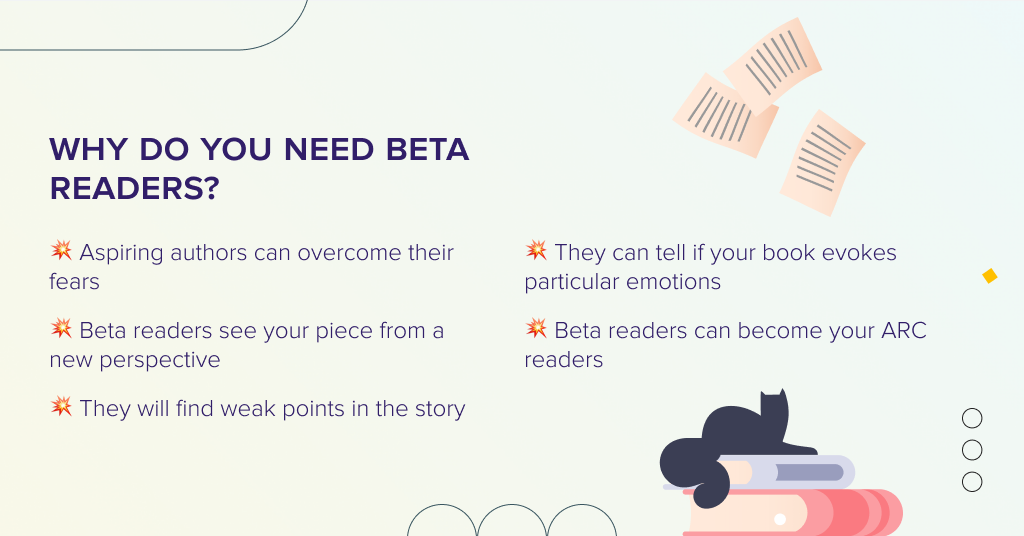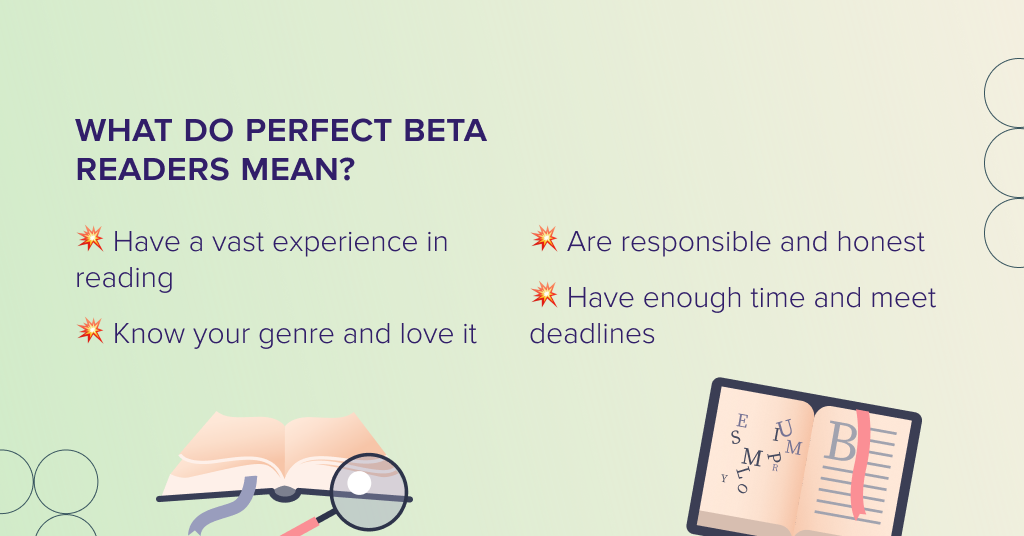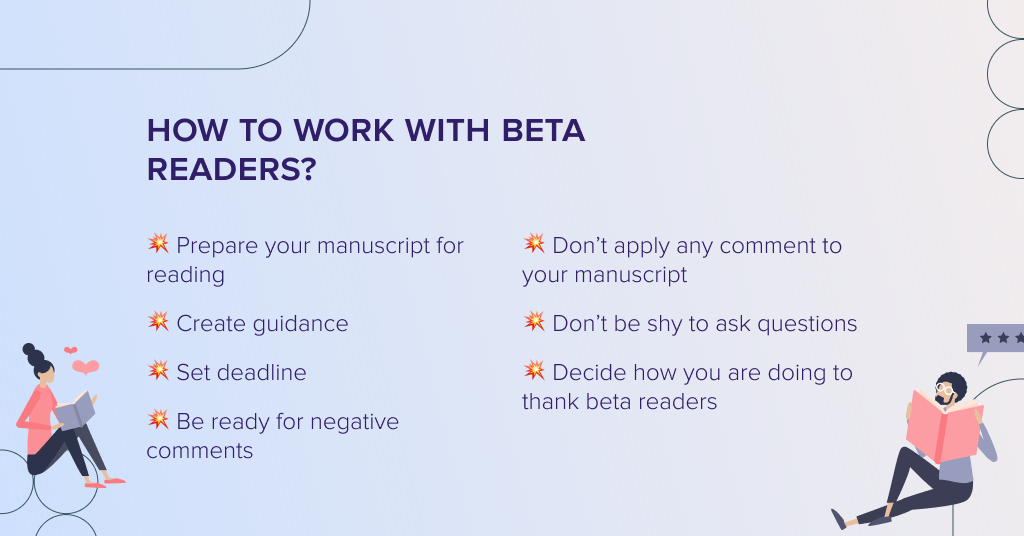A professional editor is not the only person who can improve your book. There are also beta readers who can help strengthen the plot, improve character development and act as your first audience.
Today we want to tell you why you need beta readers, how to choose perfect ones and where to find them. Keep reading to learn how to organize effective work with your test audience.
Who is a beta reader?
A beta reader is a person who reads the first draft of your manuscript and helps you find plot holes or weak points. However, beta readers are not professional editors or critics, so you shouldn’t expect them to fix everything. Also, their opinion is subjective, so you should not take everything into account.
Do all authors need beta readers? Let’s deal with this.
Why do you need beta readers?
Turning to beta readers is not essential. However, they may bring a lot of value to your book. Here’s how.
- If you are an aspiring author, you can overcome your fears. When you’re just starting as a writer and have finished your first novel, you have no experience working with an audience. You may be afraid to open up to the world, be ignored, or even receive negative comments. Beta readers are your early readers who will help you get through it, as you will interact with them, get their reactions to your novel, and face some negative comments.
- Beta readers see your piece from a new perspective. Each author spends a lot of time with their manuscript and studies it almost by heart. Under such circumstances, your view becomes sympathetic, and you cannot objectively evaluate characters or storylines. Beta readers who see the manuscript for the first time will help to cope with this.
- They will find weak points of the story. Beta readers will tell you if they feel there are gaps in the plot or a weak flow in the manuscript. They may not tell you how to fix it because they are not professional editors. But they will make you think.
- They can tell if your book evokes particular emotions. People read books for a reason. They seek experiences and feelings that are not available in real life. And every book should evoke certain strong emotions. Test readers will let you know if you succeeded in achieving this goal.
- Beta readers can become your ARC readers. They will write early reviews for your novel, which is an effective method of marketing your book after publication.

But how many beta readers do you need? In this case, the more the better because everyone has a subjective opinion.
We recommend finding a minimum of three beta readers. And their maximum number depends on your capabilities and the time left before the book’s publication. After all, you must have time to edit the manuscript and show it to a professional editor.
When don’t you need beta readers? If you are writing a heavy science book, a beta reader who does not have scientific knowledge is unlikely to help you correct all the weak points. In this case, you need to look for an expert in the field.
Where to find perfect beta readers?
The choice depends only on you, but for cooperation to be effective and valuable, there are several criteria. So, what does a perfect beta reader look like?
- This is a person who has a vast experience in reading and can immediately feel that something has gone wrong in the story.
- The right beta reader loves your genre and knows what elements, characters, conflicts, etc., should be present there.
- These people are responsible and honest because you want valuable feedback to improve your book.
- Your beta readers must have time for this work and meet deadlines.

Considering the points mentioned above, sometimes your partner or friend isn’t the best option to become your beta reader. At the very least, they may fear offending you and not being completely honest.
We figured out why we need beta readers and how to choose the best one. But where to find them? Here are some of the best places.
Facebook groups
You can find help in general groups dedicated to indie writers and specialized ones. All you need is to leave an announcement in the group’s feed. Don’t forget to specify your genre and word count. Here are some groups:
- Fiction Writing
- Beta Readers
- Beta Readers and Critique Partners
- Beta Readers Writers Club
- BetaReader Connect
Your website
You can recruit willing beta readers through your author’s website. Add a particular form where visitors can leave their contact details and terms.
Forums
Forums work like social media groups: You need to add a message to the relevant discussion. Try some of these:
- kboards
- Writing Forums
- Scribble Hub
- Writers of the Future
- Beta Reader Group on GoodReads
Your friends or colleagues
This is the easiest option, especially if you are lucky and your fellows like to read and know your genre. However, ask them to be honest and not feel sorry for you.
Job search website
You can also post an ad on a job search website. List it as a vacancy with terms of employment, details about the book, and rewards. Use platforms that are popular in your area or the well-known Upwork.
How to work with beta readers?
It is not enough to give a beta reader a book and get general feedback. Use the following tips to make your cooperation effective.
Prepare your manuscript for reading
This means you should decide:
- Which format to send the manuscript in (for example, Google Docs, Word, and PDF)
- How beta readers will comment: on the same file or each of them separately
- How to track feedback.
Test readers can provide feedback by leaving comments on the document, filling out a questionnaire, or giving an extensive review. However, you can also use modern apps to work with beta readers. They give you an opportunity to:
- Share the manuscript with selected readers
- Filter comments by readers or keywords
- Set restrictions on commenting.
Here are two feedback management apps to make things easier for you:
Create guidance
Make it easy for your beta readers by creating a list of questions. It will help guide them while reading and give helpful feedback. Here is a list of questions to include:
- Have you been captivated by the first pages?
- Is there illogicality in the events?
- What mood does the book evoke?
- Do you know what genre you read?
- What are the characters missing?
- Did you skip any parts?
- What dialogues are superfluous?
Set deadlines
A beta reader must be responsible and have time for this work. You have your plan for editing and publishing the book, so beta readers can’t send you feedback whenever they want.
Be ready for negative comments
Don’t expect everyone to like your manuscript without exception. This is a normal phenomenon you should be prepared for. Use negative comments as an opportunity to improve your story.
Remember, you don’t need to apply all comments
However, it would be best not to listen to all reviews mindlessly. You are the writer and creator of your artistic world, so act according to your feelings and desires.
Don’t be shy to ask questions
If you have additional questions after receiving feedback, feel free to ask beta readers. Perhaps they were not precise enough in expressing their opinions, and additional questions will help to find direction.
Decide how you are going to thank beta readers
Of course, your friends may read your manuscript for no good. However, third-party readers will spend personal time and effort on this. Treat it like work that needs to be paid for. Discuss these terms with beta readers: you can give thanks with your published book, money, or otherwise.

Summing up
Thus, a beta reader is someone who will look at your manuscript with a fresh eye and help you find weak points in your plot.
The ideal beta reader has the extensive reading experience, knows your genre in detail, and can give honest feedback. You can find such people in groups on social networks, forums, using your website, or a job search platform.
To make your collaboration effective, prepare a list of questions in advance, think about a way to track feedback, don’t mindlessly accept all comments, and be open to any ideas.
Do you work with beta readers? Share your experience in the comments.



